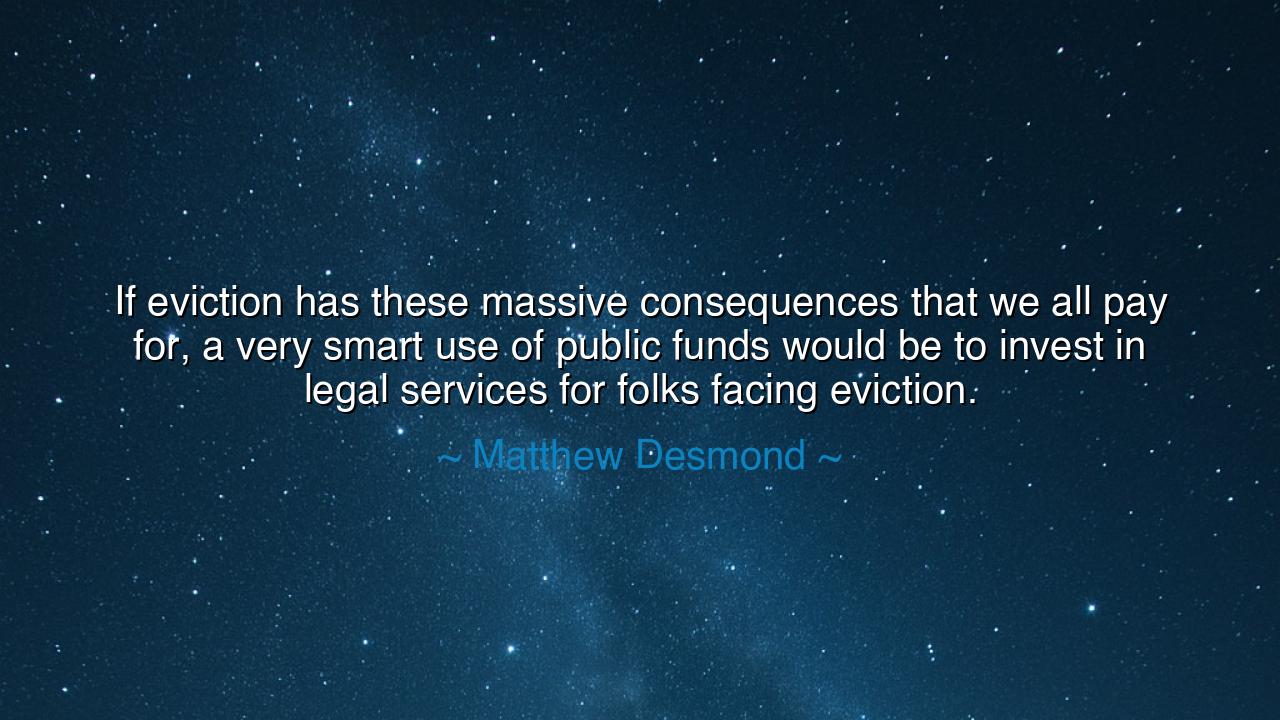
If eviction has these massive consequences that we all pay for, a
If eviction has these massive consequences that we all pay for, a very smart use of public funds would be to invest in legal services for folks facing eviction.






The words of Matthew Desmond, “If eviction has these massive consequences that we all pay for, a very smart use of public funds would be to invest in legal services for folks facing eviction,” are a plea not only for policy, but for justice clothed in compassion. In his voice echoes the wisdom of one who has seen suffering up close — who has walked through the hollow rooms of families displaced, and the silent corridors of neighborhoods broken by poverty. His words are not merely about housing or law; they are about human dignity — about recognizing that when one family falls, the burden is borne by all. For Desmond reminds us that in the grand tapestry of society, the unraveling of one thread weakens the whole cloth.
The origin of this quote lies in Desmond’s landmark work, Evicted: Poverty and Profit in the American City, a masterpiece born of years spent among the poorest residents of Milwaukee. He witnessed firsthand the violence of eviction — not the violence of war, but of despair, where homes are lost not to fire or flood, but to paperwork and powerlessness. Families who missed a month’s rent found themselves cast into the streets, their belongings scattered like memories under the open sky. From these experiences, Desmond saw the truth that eviction is not an isolated misfortune; it is a systemic wound, bleeding into education, health, safety, and the very stability of communities. And from that truth grew his conviction — that the state, the people, and the law must act not as bystanders, but as healers.
His statement carries a wisdom that would have been understood even by the ancients: that justice delayed for the poor is justice denied for the nation. In every age, societies that ignore the plight of their weakest crumble from within. When a family loses its home, the children lose their schooling, the parents lose their work, and the community loses its cohesion. Soon after, the costs spread — to hospitals, shelters, prisons, and the welfare rolls. Thus Desmond teaches that eviction is not a private sorrow, but a public debt. The wise ruler, he says, does not wait for the fire to spread before sending aid; he invests in prevention, in mercy made practical through law.
There is a precedent for such foresight in the story of Solon of Athens, the great lawgiver who saw his city torn apart by debt and bondage. When farmers, crushed by poverty, were sold into slavery for unpaid dues, Athens teetered on the brink of ruin. Solon abolished debt bondage, reformed the laws, and proclaimed a seisachtheia — a “shaking off of burdens.” His reforms did not only free the indebted; they restored balance to the state, saving it from collapse. So too does Desmond’s vision call for a modern seisachtheia — not the forgiveness of debt, but the protection of those too poor to defend themselves. He asks that the state provide legal aid, not as charity, but as a bulwark of justice, for when the law is accessible only to the rich, it ceases to be law at all.
Desmond’s insight also speaks to the sacred duty of governance — that public funds must not merely sustain the powerful, but safeguard the powerless. In every eviction hearing, there are two sides: one armed with lawyers, the other with fear. The imbalance is not only legal; it is moral. A tenant without counsel faces not a fair contest, but a silent surrender. Yet when legal services are provided, when the poor are given a voice, justice begins to function as it was meant to — as the equalizer, the guardian, the last hope of fairness. In this, Desmond calls not for revolution, but for renewal — for a society that remembers that mercy and wisdom are not opposites, but twins.
To those who would dismiss his plea as mere sentiment, Desmond offers logic: it costs less to help than to ignore. Studies have shown that investing in legal defense for tenants saves more in social costs than it spends in public funds. Children stay in schools, families remain employed, and the spiral of homelessness slows. Thus his argument is both moral and pragmatic — a rare harmony of heart and mind. The “smart use of public funds,” as he calls it, is not an expense but a form of stewardship, ensuring that society’s resources strengthen its foundation rather than patch its fractures.
Let this teaching, then, be remembered by every generation: a home is not a privilege; it is the ground from which all other rights grow. When one is deprived of shelter, one is stripped of stability, dignity, and belonging. To defend the right to housing is to defend the sanctity of community itself. The wise will see, as Matthew Desmond has seen, that compassion is not weakness and that prevention is the highest form of justice. Let those who lead invest not only in roads and armies, but in lawyers for the poor, in guardians for the voiceless, in systems that keep families from the cold. For when we defend the home of another, we defend the heart of humanity — and that is the truest use of any public treasure.






AAdministratorAdministrator
Welcome, honored guests. Please leave a comment, we will respond soon